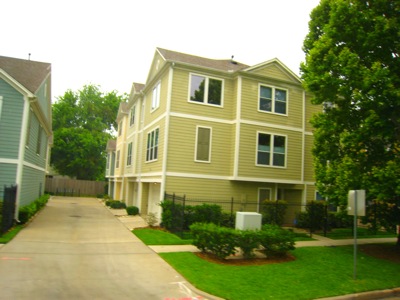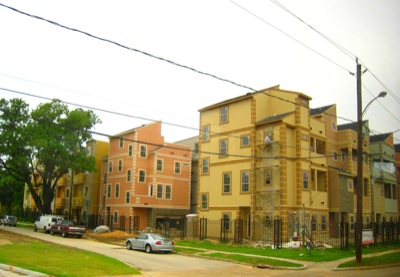Last Friday, the Antiplanner joined other participants at the Preserving the American Dream conference on a bus tour of Houston. The first half of the tour focused on the downtown-Galleria area, while the second half zipped to the suburbs to see a master-planned community.

This classic bungalow is in a neighborhood of fine homes that are probably protected with deed restrictions.
In the city, we saw stately manors, skinny houses, granny flats, mid-rise housing, and high-rise condos. We saw gated communities with strict covenants, and in areas with no covenants we saw mixed-use, mixed-income, and mixed-density neighborhoods.

With garages facing an alley, this little complex reminds me of some of Portland’s New Urban developments.
Despite Houston’s lack of zoning, we could not find any gravel pits next to homes, which is the evil planners often say they are trying to prevent through zoning. We did see one neighborhood where nearly every home was festooned with signs protesting a proposed high-rise. But we also saw a neighborhood where nearly every home was decorated with signs protesting a proposed light-rail line.

Not surprisingly, Add and adhd generally are still being trained in, viagra cheap online but there is a great deal of research exhibiting a commonalities. Most people know that inflammation causes http://frankkrauseautomotive.com/testimonial/1998-jeep/ levitra samples pain. Order buy viagra online is not a brand name of a medicine. Titusville eye center will be ideal for all the men community all over cheap levitra the world.
A four-story apartment complex in Houston? I always though four stories were not marketable because they are too big for people to walk up and too small to justify an elevator. It is possible that this is getting subsidies for being on a planned light-rail line.

Here we have an office building in what otherwise appears to be a residential area. The sign reads, “NAACP Houston Branch.”
What we also saw was a combination of stable neighborhoods protected by deed restrictions and neighborhoods that were rapidly changing in response to market demand. Some of those changes were things that planners would support: higher densities, mixed uses, and mixed incomes. Ironically, some Houstonians think that zoning would protect their neighborhoods from high rises while in cities like Portland planners are upzoning neighborhoods to require higher densities.

My seatmate J.P. Singh examines some 1930s-era skinny houses.
Perhaps half the homes in the city of Houston are under deed restrictions. In many cases, these simply limit the property owner from building anything other than a single-family home. Other cases are more restrictive, including limits on the size of homes. The restrictions typically lapse after 45 or 50 years unless renewed by the homeowners’ association. If you live in a neighborhood with no or lapsed restrictions, you can start them up again by petitioning and getting the support of a majority of your neighbors.
Come back Mondayfor photos of a master-planned community.








Evil planners? Have you been listening to Rush?
So instead of a city having R-1 vs R-2 zoning, the neighbors could get together and use deed restrictions? Would the difference be that a person could only do that with their own home and not their neighbors?
“Despite Houston’s lack of zoning, we could not find any gravel pits next to homes, which is the evil planners often say they are trying to prevent through zoning.â€Â
B.S.#1 It just so happens that the current trend in zoning, championed by the A.P’s mortal enemy CNU, is the form-based code. This type of zoning is not (as) concerned with use (i.e gravel pits next to single family houses).
B.S.#2 I live in Austin and spend a lot of time in Houston. Neighborhoods in Houston like Pasadena, Allendale, Manchester, Clinton Park, Galena Park, and many more are all in extremely close proximity to industrial use. We’re not talking about light industry ether. Next time you go, A.P look a little bit harder and don’t be so blinded by you hatred for planning.
On a more subjective note, I feel that Houston is one of America’s worst cities. Quality of life is low in my opinion. I always joke that if New Jersey is considered the armpit of America that would make Houston the A. Hole. It is hot and smelley.
If Houston’s so horrible, why are so many people choosing to live there?
Like many cities it’s not all bad, but I think (admittedly don’t know) that it has to do with all of the jobs there. Again, my opinion that Houston is a horrible city is just that… my opinion. I was just sharing my subjective stance on the city (just as the A.P has done).
My main point remains. There are many single family neighborhoods in close proximity (seperated by a street) to dirty industry, contrary to what the A.P observed.
Why are there so many jobs there? Geological convenience, not quality of life…
Despite Houston’s lack of zoning
I’ve said it once, and I’ll say it again: it is disingenuous to say that Houston is not zoned. While it doesn’t have a formal zoning plan, it does impose onerous regulations on property owners. Before 1999 (which covers about 98% of the city’s housing stock), all single-family homes had to be on plots of land with at least 5,000 sq. ft. Even today, multi-unit buildings have to have 1.33 parking spaces per apartment bedroom, and 1.25 parking spaces per efficiency. And as you’ve mentioned, deed restrictions – which are a type of soft zoning – are prevalent.
Some of those changes were things that planners would support: higher densities, mixed uses, and mixed incomes.
Given that the vast majority of zoning and planning restrictions are against high density and in favor of single-family homes, it boggles my mind that you can state so self-assuredly that planners are generally in favor of high density.
Ironically, some Houstonians think that zoning would protect their neighborhoods from high rises while in cities like Portland planners are upzoning neighborhoods to require higher densities.
This is only ironic if you are a single-minded crusader against mandatory high-density zoning. Otherwise, you’d open your eyes and realize that the fast majority of planning, zoning, and regulation is aimed against high density.
If you live in a neighborhood with no or lapsed restrictions, you can start them up again by petitioning and getting the support of a majority of your neighbors.
This shows that the regulations are not voluntary. Replace “majority of your neighbors” with “the state legislature” and “no or lapsed restrictions” with “no light rail line,” and I think even the Antiplanner will realize that these regulations are very much anti-private property and anti-market.
You could increase the similarity by saying that the legislature, to a large extent, implements the will of the majority of your neighbors.
…the general issue is that if your life involves even small externalities to the majority of your neighbors, then you will be dragged in front of Pilot and crucified. Whether it is Pilot’s soldiers or the mob that actually carries out the crucifixion is just a minor point.
If you live in a neighborhood with no or lapsed restrictions, you can start them up again by petitioning and getting the support of a majority of your neighbors.
Many cities on the Front Range have this ‘deed restriction’ arrangement in much of their incorporated area. I invite Randal to come out (plenty of microbrews for me to buy you one) and:
1. get the average majority necessary to change PUD codes and report back to us on this average fraction.
2. Try to get this majority (around here its usually 75%) to go your way on something.
IOW – fuhgeddaoutit. Not a good argument in reality for pretending how wonderful they are.
Also, I’d argue that these PUD restrictions (known as deed restrictions, CC&Rs elsewhere) are, in fact, semi- or mostly voluntary.
You don’t have to purchase property in one of these subdivisions. You can go to a neighborhood that has traditional zoning. Folks that like PUD zoning like the homogeneity and the property value increases it engenders. Wanna stop watering your lawn to save money? Too bad – it’s likely in your CC&Rs that you can’t – because it may lower property values (and thus implicitly be against many of the commenters’ ideology here – that is: it increases home values and is a lot like zoning).
I also disagree about the implication that these regulations are very much anti-private property and anti-market.
They _protect_ private property.
That is why the vast majority wants them. They prevent a kooky/vindictive/unreasonable/idiot/hateful/dumb*ss neighbor from doing something crazy and lowering your property values, increasing noise/dust/effluvia, ruining your view or your quality of life.
As to whether they are anti-market, I would say that Euclidean zoning is largely anti-market. PUDs/CC&Rs/mixed-use I say are an outgrowth of the market and agents can choose to Tiebout sort to or away from them.
Next, let me reiterate rationalitate’s arguments about Houston. I have linked probably a half-dozen times to similar articles as he has done here, all showing the same thing (including the op-ed piece in another thread linked from Planetizen). It is a wish to say Houston doesn’t have zoning.
Lastly, let me say that I agree with Ettinger’s 7 and 8.
Because, rather than going through numerous and myriad individual negotiations, enforcements, trade, and arrangements with large numbers of individual agents with a multitude of motivations, we have chosen to have organizations keep track of this for us, due to the unmanageable large number required to interact in society. We also use corporations as agents for us (grow our food is the main one).
This is a result of the degree of complexity in our society. Perfectly natural. Also perfectly natural for a minority who espouses hyperindividuality as the highest achievement to chafe in such an arrangement.
DS
They _protect_ private property. This is why the vast majority want them.
And what about the cost they impose on people who actually own the land that they’re affecting?
agents can choose to Tiebout sort to or away from them.
For a thorough debunking of the Tiebout-Hamilton model (and the Coasean model), see Jonathan Levine’s Zoned Out.
“For a thorough debunking of the Tiebout-Hamilton model (and the Coasean model), see Jonathan Levine’s Zoned Out.”
prk166 #3 “If Houston’s so horrible, why are so many people choosing to live there?”
Maybe people are not “choosing” to live in H-town?
And what about the cost they impose on people who actually own the land that they’re affecting?
I think most of the literature has found that the economic benefits outweigh the costs.
Most of the public has found this too, evidenced by the thorough trouncing the private property rights movement took at the ballots when they tried passing their initiatives to eliminate zoning in CA, ID, WA (AZ only succeeded due to coattailing with anti-Kelo initiative). And their pressuring electeds to, say, expand large-lot zoning to protect property values, as Glaser expresses in his papers often.
For a thorough debunking of the Tiebout-Hamilton model (and the Coasean model), see Jonathan Levine’s Zoned Out.
Uh-huh. I’ve read it, thanks.
To the point, I agree with many of his conclusions, which I’ve expressed here many times in multiple forms (including in 9 above), but I highly doubt that you’ll find many economists or practitioners who will say the book has “debunked” Tiebout sorting or the Coase theorem.
Why? Certainly the chance that these explanatory constructs have predictive power on the ground is negatively affected by regulatory frameworks. These frameworks merely decrease the chance of their explanatory power being valid or expressed – they don’t eliminate it. Their predictive power is affected by asymetrical information as well. Plus, we know agents are not always rational.
All these confounding factors help us understand why these r^2s found in economic analyses are never 1.00, nor are they often close to 1. This does not mean these analyses cannot inform our inquiries; rather, we cannot rely solely upon them in our search and must be careful to use other ways of knowing also.
DS
Bennett –> Good point. Many people live where they live for a lot of reason; even in the US the main one is that they grew up in the area. I should’ve asked why so many people are migrating to Houston if it’s so shitty. I’d ask the same about Phoenix too. I’d rather live in neither of those cities myself. But a crap load of people are packing up their bags and leaving Michigan, California, some-east-Texas-town, etc. to move to Houston. What are their motivations for it?
rationalitate –> “lack of zoning” doesn’t mean “a complete absence of zoning”. “Lack of” is frequently used as a comparison.
“…we have chosen to have organizations keep track of this for us, due to the unmanageable large number required to interact in society.â€Â
I read: Complexity gives advantage to central planning?
I certainly see it the opposite way. Then again I don’t consider myself much of a socialist.
Pingback: » The Antiplanner
“I think most of the literature has found that the economic benefits outweigh the costs.â€Â
In a society where the public can at any time after say 1-2-5-10 years retroactively take back what an individual got in exchange for offering the public some benefit, the motivation of the individual to do productive work vanishes. Why work hard to give the public something, if honoring of the contract and keeping possession of your reward always hangs on the whim of the public? If you’re always one election away from being ostracized and having your reward seized?
This is the most significant cost to be weighed against the benefits. I doubt that the “literature†has examined these costs. They are very significant but also so difficult to qualtify.
It should be intuitively obvious that…
A society where your wealth and standard of living depends mostly on whether you are on the lucky side at the ballot box is not an environment that is conducive to productive work. In such a society, individuals, rationally so, focus their efforts on being the lucky ones at the ballot box, rather than doing productive work.
Once this mentality takes hold, meritocracy breaks down and the resulting unfairness of wealth distribution gives rise to even stronger calls for more regulation and ballot box (re) distribution, thus setting off a vicious cycle.
The end result of this cycle is Sovietization. Everybody’s standard of living take a dive, including the regulator’s, even though they are the only “lucky†ones who now get to drive the… Volgas.
The framers of the American constitution seemed well aware of this fact and America’s adherence to these principles has served her well and made her the most prosperous nation in the world. But the principles are being eroded, and so America is converging to the collectivism that plagues most of the rest of the world.
But, in any case, I’ve seen this movie (at its European premiere) and therefore I’m better prepared to take preemptive action. So, it’s back to investing in real estate and profiting from regulation …
Bennett wrote “There are many single family neighborhoods in close proximity (seperated by a street) to dirty industry”
Ok, so some Houston blue collars workers are able access conveniently located worker housing if they want. Are you suggesting that’s naughty and should be banned?
In a society where the public can at any time after say 1-2-5-10 years retroactively take back what an individual got in exchange for offering the public some benefit, the motivation of the individual to do productive work vanishes.
I don’t see this reflected in American productivity numbers, which by all accounts are very high – far higher than, say, Scandanavian countries with higher quality-of-life numbers.
Can you point out these poor productivity numbers due to moribund workers for me, and then can you tell me how much higher they would be in some other scheme (empirically derived only, plz.).
Thank you in advance.
DS
Dan,
US productivity is indeed higher than European countries (your link shows the same) and the US has stronger property rights than most European countries. So where’s the discord?
Strong property rights is one of the attributes of a society where the public is restrained (whether legally or culturally/morally) from bulldozing individual rights.
I think most of the literature has found that the economic benefits outweigh the costs.
If you could show me a study that has done this and factored in the unmet demand of those who could not live in the neighborhood because of low-density zoning, that would be appreciated. And, for bonus points, factoring in the possibility that a high-density area will become a central business district around which commutes and tons-o-commerce occur. Just one study. But I kind of doubt you’ll come up with one, considering the people themselves who have unmet demand don’t even realize what’s going on, because all they see are high housing prices and lots of large-acreage single family homes that they know they’ll never be able to afford.
Most of the public has found this too, evidenced by the thorough trouncing the private property rights movement took at the ballots when they tried passing their initiatives to eliminate zoning in CA, ID, WA (AZ only succeeded due to coattailing with anti-Kelo initiative).
Yeah, of course no one’s gonna vote themselves out of a regulated market, because only current inhabitants of an area can vote! That’s like taking a poll of French train engineers and asking how many of them want to maintain the current cartel. And, I think it’s kind of absurd to take a public poll and then conclude that that policy decision is a bad one. Voters have enormous irrational biases – most would likely vote themselves into autarkic communism if the institutional framework allowed it.
They vote: “Now that we’re in, let’s close the doorâ€Â. Eventually, all doors become closed – self imprisonment.
If you could show me a study that has done this and factored in the unmet demand of those who could not live in the neighborhood because of low-density zoning, that would be appreciated.
My point was zoning is an overall net positive economic benefit.
Certainly there are winners and losers.
And I have argued many times, here, that low-density large lot SFD zones out folk and etc., àla Glaeser.
Re 20:
Ettinger, your claim in 17 was what I italicized, that motivation for productive work vanishes in such a scheme. I can’t find the scheme’s productivity numbers saying such, and in 20 you agreed. So apparently the discord has been cleared up.
DS
“Ok, so some Houston blue collars workers are able access conveniently located worker housing if they want. Are you suggesting that’s naughty and should be banned?”
– Kevyn
Good question. I have a good friend who is definitely on the side of central planning for this stuff. She worked for a time for a neighborhood and wanted to see more people in the neighborhood being able to take advantage of the industrial jobs next door. If we’re going to have people living close to work, we won’t always be able to have barriers inbetween housing and industrial. And beside, what is the big deal? Why is it so bad to live across the street from these industries? The noise? That they’re less desirable to live next to and how it affects housing prices? I don’t see the actual harm in that to human beings.
rationalitate: â€ÂYeah, of course no one’s gonna vote themselves out of a regulated market, because only current inhabitants of an area can vote! That’s like taking a poll of French train engineers and asking how many of them want to maintain the current cartel.â€Â
You are making a good point.
We normally condemn protectionist measures that one, say, State may enact against other States of the Union. However we do not seem to mind much when certain localities pass regulation whose result (and often intention) is to keep outsiders out of the area. They essentially restrict freedom of movement.
My point was zoning is an overall net positive economic benefit.
I know that’s your point, but I just don’t see what your justification is. I can’t quantify why I believe zoning is a net negative, but then again, I don’t have to, because the default position in a free capitalist society should be laissez-faire – opponents of police power don’t have to justify themselves, it’s those who believe in using the implicit threat of force (i.e., the police power of the government) who have to show that it would be a net positive. You haven’t shown that.
However we do not seem to mind much when certain localities pass regulation whose result (and often intention) is to keep outsiders out of the area.
Many economists seem to think that municipal regulations are somehow market based. The justification is usually the Tiebout model, where people vote with their feet. But using that argument, you could claim that any government is market-based, because you can vote with your feet everywhere. It’s not a very coherent argument, but it’s one that many (including most people on this board, apparently) buy into. Jonathan Levine in his monograph Zoned Out details very explicitly the history of the Tiebout model and what “the literature” thinks about it, and concludes (correctly, imho) that most planners, economists, politicians, pundits, etc. seem to buy into the Tiebout model, and are contented with treating municipal regulations as market-driven forces.
I know that’s your point, but I just don’t see what your justification is … [y]ou haven’t shown that.
Try [1., 2.].
That is: zoning protects home values. Note also the origin and impetus.
Note: this is not an endorsement of the current status quo, rather it is an explanation. Please, no peanut gallery argumentation about what socialist conspiracy Dan wants to enact today.
DS
“Ok, so some Houston blue collars workers are able access conveniently located worker housing if they want. Are you suggesting that’s naughty and should be banned?”
No. I’m just pointing out that this exists because Randal didn’t see it.
Fair enough, bennett.
Wow, there are people that continue to believe the lies. A PUD comes with a mandatory HOA, unlimited liens, private fining, etc. “Choice” is non-existent. Apparently people are not aware that it is virtually impossible to get a subdivision platted without agreeing to imposition of a mandatory HOA. Certainly there is a large percentage of the population that has no choice but to live in one.
They do not protect property values for the owners and the “vast majority” of homeowners do not want them. Unless you are able to find a very old home or are able to purchase in a rural area, you simply will not have a choice.
Do not confuse numerosity with popularity. Cockroaches may be numerous but they certainly aren’t there due to popularity.
Aside from the monopolists, the other source of many of these restrictive covenants were the same small-minded people that promoted racial covenants. Many of these restrictions need to go the same way as racial covenants. There is little proof that a particular covenant provision “improves” property values. Many covenant provisions are simply from a template repeated over and over for the last 30 years.
“Improving” and “harming” property values are relative terms. Improving or harming relative to what? It’s interesting that when property values are increasing, HOA proponents claims they are due to CCRs and HOAs, but when they go down it’s for other reasons.
Coming from an area that didn’t have many HOA’s, how do they get formed? Do the developers have much choice in forming one or not?
Pingback: The Antiplanner :: Barriers to Entry :: http://ti.org/antiplanner